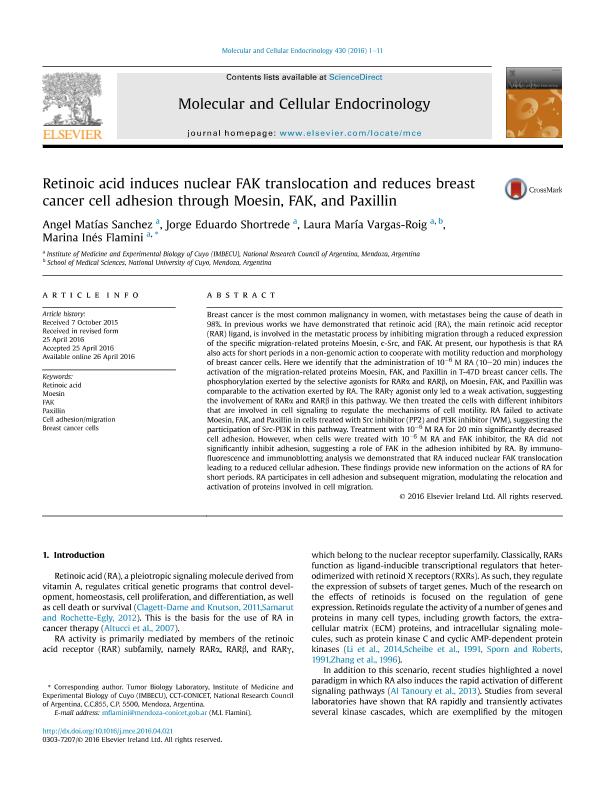Mostrar el registro sencillo del ítem
dc.contributor.author
Sanchez, Angel Matias

dc.contributor.author
Shortrede, Jorge Eduardo

dc.contributor.author
Vargas Roig, Laura Maria

dc.contributor.author
Flamini, Marina Ines

dc.date.available
2018-06-22T20:32:07Z
dc.date.issued
2016-07-15
dc.identifier.citation
Sanchez, Angel Matias; Shortrede, Jorge Eduardo; Vargas Roig, Laura Maria; Flamini, Marina Ines; Retinoic acid induces nuclear FAK translocation and reduces breast cancer cell adhesion through Moesin, FAK, and Paxillin; Elsevier Ireland; Molecular and Cellular Endocrinology; 430; 15-7-2016; 1-11
dc.identifier.issn
0303-7207
dc.identifier.uri
http://hdl.handle.net/11336/49783
dc.description.abstract
Breast cancer is the most common malignancy in women, with metastases being the cause of death in 98%. In previous works we have demonstrated that retinoic acid (RA), the main retinoic acid receptor (RAR) ligand, is involved in the metastatic process by inhibiting migration through a reduced expression of the specific migration-related proteins Moesin, c-Src, and FAK. At present, our hypothesis is that RA also acts for short periods in a non-genomic action to cooperate with motility reduction and morphology of breast cancer cells. Here we identify that the administration of 10-6 M RA (10-20 min) induces the activation of the migration-related proteins Moesin, FAK, and Paxillin in T-47D breast cancer cells. The phosphorylation exerted by the selective agonists for RARα and RARβ, on Moesin, FAK, and Paxillin was comparable to the activation exerted by RA. The RARγ agonist only led to a weak activation, suggesting the involvement of RARα and RARβ in this pathway. We then treated the cells with different inhibitors that are involved in cell signaling to regulate the mechanisms of cell motility. RA failed to activate Moesin, FAK, and Paxillin in cells treated with Src inhibitor (PP2) and PI3K inhibitor (WM), suggesting the participation of Src-PI3K in this pathway. Treatment with 10-6 M RA for 20 min significantly decreased cell adhesion. However, when cells were treated with 10-6 M RA and FAK inhibitor, the RA did not significantly inhibit adhesion, suggesting a role of FAK in the adhesion inhibited by RA. By immunofluorescence and immunoblotting analysis we demonstrated that RA induced nuclear FAK translocation leading to a reduced cellular adhesion. These findings provide new information on the actions of RA for short periods. RA participates in cell adhesion and subsequent migration, modulating the relocation and activation of proteins involved in cell migration.
dc.format
application/pdf
dc.language.iso
eng
dc.publisher
Elsevier Ireland

dc.rights
info:eu-repo/semantics/openAccess
dc.rights.uri
https://creativecommons.org/licenses/by-nc-sa/2.5/ar/
dc.subject
Breast Cancer Cells
dc.subject
Cell Adhesion/Migration
dc.subject
Fak
dc.subject
Moesin
dc.subject
Paxillin
dc.subject
Retinoic Acid
dc.subject.classification
Patología

dc.subject.classification
Medicina Básica

dc.subject.classification
CIENCIAS MÉDICAS Y DE LA SALUD

dc.title
Retinoic acid induces nuclear FAK translocation and reduces breast cancer cell adhesion through Moesin, FAK, and Paxillin
dc.type
info:eu-repo/semantics/article
dc.type
info:ar-repo/semantics/artículo
dc.type
info:eu-repo/semantics/publishedVersion
dc.date.updated
2018-06-18T19:09:54Z
dc.journal.volume
430
dc.journal.pagination
1-11
dc.journal.pais
Irlanda

dc.journal.ciudad
Dublin
dc.description.fil
Fil: Sanchez, Angel Matias. Consejo Nacional de Investigaciones Científicas y Técnicas. Centro Científico Tecnológico Conicet - Mendoza. Instituto de Medicina y Biología Experimental de Cuyo; Argentina
dc.description.fil
Fil: Shortrede, Jorge Eduardo. Consejo Nacional de Investigaciones Científicas y Técnicas. Centro Científico Tecnológico Conicet - Mendoza. Instituto de Medicina y Biología Experimental de Cuyo; Argentina
dc.description.fil
Fil: Vargas Roig, Laura Maria. Consejo Nacional de Investigaciones Científicas y Técnicas. Centro Científico Tecnológico Conicet - Mendoza. Instituto de Medicina y Biología Experimental de Cuyo; Argentina
dc.description.fil
Fil: Flamini, Marina Ines. Consejo Nacional de Investigaciones Científicas y Técnicas. Centro Científico Tecnológico Conicet - Mendoza. Instituto de Medicina y Biología Experimental de Cuyo; Argentina
dc.journal.title
Molecular and Cellular Endocrinology

dc.relation.alternativeid
info:eu-repo/semantics/altIdentifier/url/https://www.sciencedirect.com/science/article/pii/S0303720716301344
dc.relation.alternativeid
info:eu-repo/semantics/altIdentifier/doi/https://doi.org/10.1016/j.mce.2016.04.021
Archivos asociados
